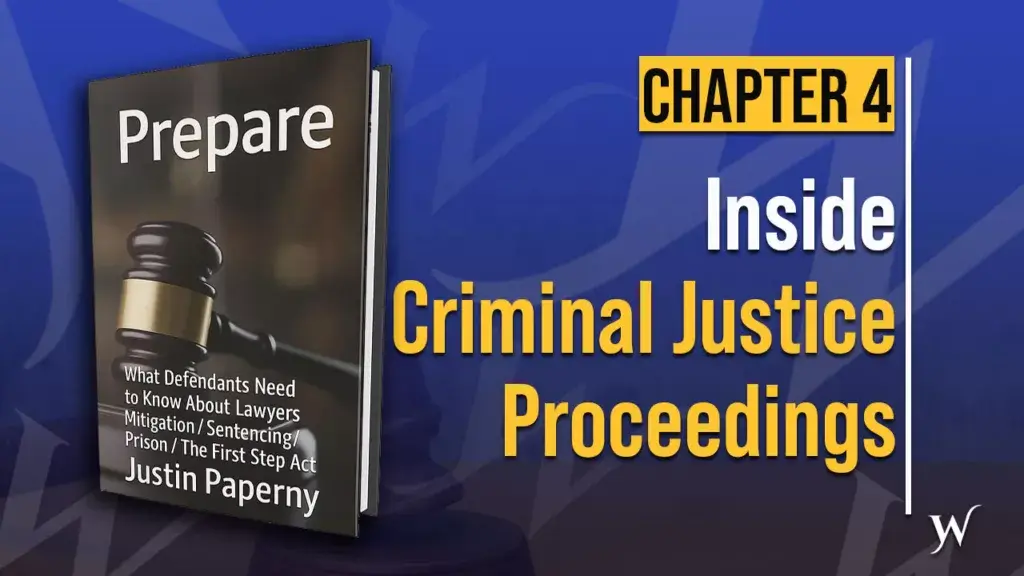Table of Contents
Understanding the Role of a Criminal Defense Attorney
Most people wait too long to figure out how to hire a criminal defense lawyer, and by then, the damage is already done. In this chapter, I walk through the mistakes I made when I hired a large firm without understanding billing, how another client burned through six figures by trusting promises instead of experience, and how our team at WCA helped Darren evaluate lawyers—quietly, quickly, and with better questions.
You will see the issues defendants routinely overlook: hourly billing traps, unrealistic guarantees, the difference between federal and state experience, why sentencing advocacy matters more than most realize, and how a short “test engagement” can reveal far more about a lawyer than a polished website or a free consultation. This chapter gives you a practical framework for evaluating a criminal defense lawyer so you can protect your money, your options, and your future before you sign a retainer.
What to Consider Before Hiring a Criminal Defense Lawyer
When Darren first called me, he had been in business for more than a decade and worked with corporate lawyers extensively. He contacted me when he realized some of his decisions on the job could expose him to regulatory problems and possibly to challenges from the Department of Justice, and he needed to figure out how to find a criminal defense lawyer he could trust.
Darren’s situation reminded me of my own problems. I was a stockbroker at UBS when I learned that some of my decisions brought me to the attention of officials at the United States Attorney’s Office and the Securities and Exchange Commission. I knew I needed counsel, but I didn’t know how to find the right lawyer.
When authorities like the SEC, FCC, FTC, or FDA start asking questions about a person, it is almost always better to retain counsel before trying to respond alone. Darren had the right instinct to research his options and clarify his approach to hiring a lawyer.
By the time we spoke, Darren had already spent a lot of time on our website and YouTube channel. Because he could identify with my background, he reached out and asked how I went about finding a lawyer to represent me. I told him the truth: an acquaintance told me to hire a lawyer from the Jones Day law firm.
“I’ve heard of Jones Day,” Darren said. “They’re supposed to be great. How did it work out?”
He was right. The lawyers at Jones Day are some of the best litigators in the world. With more than 2,500 lawyers practicing across the US, Europe, and Asia, Jones Day has a strong reputation. But that reputation comes with a cost. Their lawyers command some of the highest fees in the legal profession. As I recall, I paid $50,000 just to get in the door, without knowing whether they could help me. They exhausted those funds within the first 24 days.
I would have liked to have understood legal billing better before I signed the agreement. Because I retained Jones Day without a clear understanding of cost, I put myself at a serious disadvantage. That decision cost me both time and money.
At first, I felt upset by the bills. Eventually, I had to admit the obvious: I was the one who did not know how to evaluate counsel or how to find a criminal defense lawyer who fit my situation and budget. My ignorance led to a costly mistake.
When I realized I could not afford to pay a mid–six-figure legal fee, I had to let Jones Day go. Then I went back into the marketplace and started over with a different lawyer.
Finding a lawyer is easy. Finding the right lawyer is something else.
Common Mistakes Defendants Make When Hiring a Lawyer
I told Darren about another client, Jim, who used Google to find his lawyer.
His search produced an endless list of attorneys. Each had a polished website that touted experience and expertise.
“I didn’t know what to expect, or how to hire a lawyer,” Jim told me.
Jim scheduled an appointment with the first lawyer on the list. The lawyer listened to Jim’s description of his problem and said, “Based on what you’re telling me, I think I can keep you out of federal prison.”
That statement was exactly what Jim wanted to hear, but it was not what he needed to hear. Still, it was enough for him. Jim signed a retainer agreement and provided the lawyer with a cashier’s check for $50,000. The agreement required Jim to keep $50,000 in the lawyer’s trust account at all times. The lawyer’s rate was $800 per hour.
At least Jim thought he knew what he was paying. On his next visit, the lawyer surprised him. After reviewing the case, the lawyer said he wanted Jim to hire a second lawyer. After more discussion, Jim paid another $50,000 retainer to a second lawyer, who would also bill at $800 per hour.
When Jim sat in meetings, both lawyers were present. Jim did not realize he was paying $1,600 per hour for those meetings while the lawyers worked to understand the complexities of his case. He felt as if the first lawyer misrepresented himself just to secure the engagement. Having already spent $100,000, Jim felt too far down the road to make a change.
Darren listened to these examples and felt discouraged. If Jim did not find the right lawyer and I initially made similar mistakes, he wondered how he should move forward.
How We Helped Darren Find a Criminal Defense Lawyer
Our team has worked with hundreds of defense lawyers, attended thousands of sentencing hearings, and observed real outcomes. Over time, we developed a clear sense of what distinguishes a reliable lawyer from one who simply has a good website or strong marketing.
Rather than sending people into a directory with thousands of names, we profile a small number of lawyers in each federal district and focus on those who understand mitigation, sentencing, and the realities of federal prison. If we do not yet have a lawyer in a specific district, we do the vetting, locate candidates, interview them, and then make introductions.
Within a few hours of using TopWCA.com, Darren identified several highly recommended lawyers in Los Angeles. Each lawyer had specific experience with the type of case Darren could face.
TopWCA.com connected Darren with lawyers like Peter Hardin, Diane Bass, and Mark Werksman—lawyers who put their clients first, embrace mitigation, and work diligently on their clients’ behalf. Those are the types of lawyers we profile and recommend, so a defendant does not have to guess who might be a good fit.
Questions We Ask When Vetting Lawyers
As part of the vetting process for Darren, I reached out to these lawyers and asked a series of questions to gauge their fit. I wanted to understand:
Hourly Rates and Budget
- What is the rate for billable hours?
Defendants need at least a rough idea of the budget required. In some cases, a lawyer may resolve plea negotiations and a guilty plea in fewer than 100 billable hours. In other cases, preparing for trial in federal court may require several hundred hours. - Will the lawyer consider a flat fee?
A flat fee can be helpful because a defendant knows the total cost up front. On the other hand, once paid, some lawyers may feel less pressure to devote additional time to the case. Every matter is different.
For context, resources like the U.S. Courts and the DOJ Justice Manual show how complex federal cases can become and why time and preparation quickly add up.
Practice Focus and Case Type
- What types of cases does the lawyer handle most often?
A lawyer who primarily defends tax cases may not be the best fit for a defendant facing mail fraud charges with potential exposure to prison. Matching experience to the actual conduct and statutes matters.
If you want to understand how case types connect to outcomes and sentencing ranges, it helps to read about federal sentencing guidelines so you can ask more specific questions.
Sentencing Experience
- What is the lawyer’s experience with sentencing?
More than 75 percent of people charged in federal court eventually have a sentencing hearing. A defendant should know how comfortable the lawyer is with sentencing advocacy in the relevant jurisdiction and how often the lawyer appears before the same judges and probation officers.
The FBI’s white-collar crime resources and the Justice Manual both explain how investigations build toward charging and sentencing, which makes the lawyer’s sentencing experience especially important.
Team Structure and Cost Management
- What is the size and structure of the lawyer’s team?
A lawyer with a larger team may assign some tasks to associates or paralegals who bill at lower rates. That structure can help control costs if the lawyer is thoughtful about workflow.
Communication Style
- How does the lawyer communicate with clients?
Some lawyers make themselves readily available, even sharing cell phone numbers. Others prefer to work independently and communicate less frequently. Neither style is inherently right or wrong, but the defendant should know what to expect.
Limited Engagement to Test Fit
- Will the lawyer accept a limited engagement to get started?
Some attorneys will not begin work without a substantial minimum retainer. In federal cases, that initial retainer often exceeds $50,000. As Jim experienced, it is difficult to evaluate a lawyer based on a single free consultation.
For Darren, this last point made a big difference.
Peter Hardin, a criminal defense lawyer with Peter Hardin Defense in Los Angeles, agreed to start with a small retainer for a few hours of work. He made several calls, clarified what was happening in the investigation, and gave Darren a better sense of risk. The relationship has served Darren well. Despite an investigation that has lasted years, Darren reports that Mr. Hardin has been responsive and consistent. He gives a strong endorsement of the representation he has received.
Create a Written Plan Before You Meet Any Lawyer
If you are trying to find a criminal defense lawyer, you will make better decisions if you create a simple plan before you meet anyone.
To the extent possible, write out a list of questions that matter most to you. Be honest about your current situation and about what you expect. If you go into a meeting and minimize your conduct, you can set yourself up for poor recommendations and worse outcomes.
When Insurance Pays the Bill but Not the Price

Brian was a director at a large financial services company in Orange County, California. His employer had an officers-and-directors insurance policy that would pay his legal fees.
When federal authorities indicted Brian, he hired an experienced white-collar defense attorney. The firm sent all its bills to the insurance company. The lawyers pursued a scorched-earth defense strategy and quickly burned through the $500,000 cap on legal fees. Once the insurance funds were gone, they told Brian he should plead guilty and that he would be responsible for the remaining $75,000 in fees.
“I always knew that, at the end of the day, I was going to plead guilty,” Brian told me. “When I went to find a lawyer, I went along with whatever they proposed. They wanted to contest every document. Every time they reviewed a document, they billed a high fee. Their invoices showed I was burning through more than $20,000 a day in legal fees.”
If Brian knew he would eventually plead guilty, he may have been better served by hiring a lawyer with a strong record of negotiating plea agreements, sentencing advocacy, and planning for post-sentencing issues like First Step Act time credits.
Putting It All Together
In the end, any defendant who needs to learn how to evaluate counsel should follow the path Darren used as a model:
- Use personal and professional contacts to identify lawyers who have real experience with your type of case and your jurisdiction.
- Prepare a written list of questions about billing, case strategy, sentencing experience, and communication.
- When possible, ask the lawyer to accept a limited engagement to test fit before you commit to a large retainer.
- Confirm that you have the financial resources to support the strategy you choose.
If you want to go deeper on how lawyers, mitigation, and preparation affect outcomes, you can also review our material on federal prison preparation and related sentencing content on our website.
Our team at White Collar Advice continues to document how defendants like Hugo Mejia and Stanley Benton selected their lawyers and held them accountable, as described in our New York Times profile. The point is not to promote any one lawyer, but to show that informed, documented decisions tend to lead to better results.
If you have questions about building a plan, you can contact our team, attend a weekly webinar, or review the free courses we make available on topics such as character reference letters, probation reports, and RDAP. Use those resources to help you ask better questions and to document the decisions you make.
Thank You,
Justin Paperny is an ethics and compliance speaker and founder of White Collar Advice, a national crisis management firm that prepares individuals and companies for government investigations, sentencing, and prison. He is the author of Lessons From Prison, Ethics in Motion, and the upcoming After the Fall. His work has been featured on Dr. Phil, Netflix, CNN, CNBC, Fox News, The Washington Post, and The New York Times.
FAQ
When should I contact a criminal defense lawyer if regulators start asking questions?
As soon as you learn about government inquiries, contact counsel before responding so you do not make statements or decisions that create additional exposure.
How much does a federal criminal defense lawyer usually cost?
Fees vary widely, but initial retainers in serious federal matters often start around $50,000 and can climb quickly depending on complexity and trial preparation.
Is it risky to hire the first lawyer I find online?
Yes. Many sites highlight design and marketing, not actual track records, so you should still vet billing, experience, and sentencing work before signing a retainer.
Should I insist on a flat fee instead of hourly billing?
Flat fees provide certainty but may reduce the incentive to devote more time later, so you should weigh predictability against the complexity and likely duration of your case.
How important is sentencing experience when choosing a lawyer?
Very important, because most federal cases resolve with a plea and sentencing hearing, where preparation and advocacy can influence guideline calculations and conditions of confinement.
What questions should I ask in a first meeting with a lawyer?
Ask about typical cases, hourly or flat fees, sentencing experience in your district, communication practices, and whether the lawyer will consider a limited engagement to start.
Can I change lawyers after I have already paid a large retainer?
You usually can, but you may face nonrefundable fees and delay, which is why it is better to vet carefully before committing to a significant payment.
How do I know whether a lawyer is being realistic about keeping me out of prison?
You should ask the lawyer to explain the guideline range, comparable cases, and the basis for any optimistic statements rather than relying on promises alone.
Does it matter if my lawyer mostly handles state cases instead of federal ones?
Yes. Federal cases follow different rules, guidelines, and procedures, so you should confirm substantial federal experience when your exposure is in federal court.
Should I tell my lawyer everything, even if it makes me look worse?
Yes. A lawyer cannot guide strategy or negotiate effectively if you minimize conduct or leave out key facts about your role in the offense.
Is it helpful to get a second opinion before signing a large retainer agreement?
Often it is. A second opinion can highlight differences in strategy, pricing, and sentencing approach that you might not see in a single meeting.
How does insurance coverage for legal fees affect my choice of lawyer?
Insurance can reduce your out-of-pocket cost, but it can also incentivize aggressive billing, so you still need to question strategy, scope, and how quickly limits may be exhausted.




